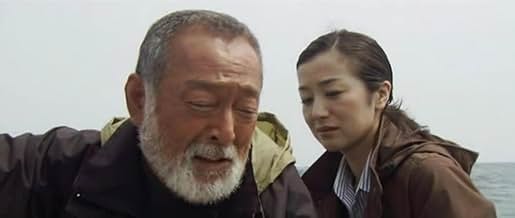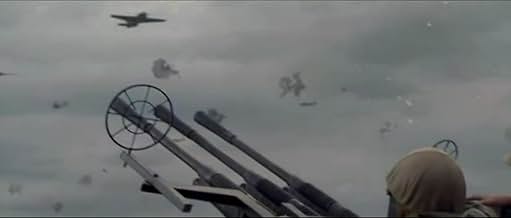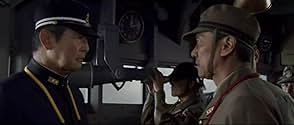Adicionar um enredo no seu idiomaThe movie follows 3 Japanese friends from embarking on Yamato, the world's largest battleship, until it's sunk 3 1/2 years later on April 7, 1945 on it's way to Okinawa to stop American adva... Ler tudoThe movie follows 3 Japanese friends from embarking on Yamato, the world's largest battleship, until it's sunk 3 1/2 years later on April 7, 1945 on it's way to Okinawa to stop American advance at the end of WWII.The movie follows 3 Japanese friends from embarking on Yamato, the world's largest battleship, until it's sunk 3 1/2 years later on April 7, 1945 on it's way to Okinawa to stop American advance at the end of WWII.
- Direção
- Roteiristas
- Artistas
- Prêmios
- 6 vitórias e 7 indicações no total
- Atsushi
- (as Sosuke Ikematsu)
Avaliações em destaque
"Otoko-tachi no Yamato" is a dramatic movie based on the true story of the Battleship Yamato in World War II. This film gives an approach of Japanese relationship in war totally different from the stereotype of American and European movies of this genre that usually treat Japanese soldiers as cold blood killers detached from any emotions. In "Yamato!", the Japanese military are human beings, with beloved ones, families and comradeship between them, giving more credibility to the story. However, director Junya Sato exaggerates in the melodramatic subplots and in many moments the viewer has the sensation of watching a soap-opera instead of a drama. The final battle of Yamato is engaging and one of the best moments of this film. The music score is repetitive and boring and I personally did not like it. Last but not the least, the Shōwa period mentioned by Katsumi Kamio in one of his last lines literally means, in accordance with the Wikipedia, "period of enlightened peace", or Shōwa era, is the period of Japanese history corresponding to the reign of Emperor Shōwa (Hirohito), from December 25th, 1926 to January 7th, 1989. My vote is seven.
Title (Brazil): "Yamato"
This film shows People. People in tragic times. People fighting for their loves and their lives. Whether it is Yamato, Saving Private Ryan, The Thin Red Line, Brotherhood, Stone's trilogy, Eastwood's duo of films, etc, it comes down to people trying to live. So much has been said about the film that is political but I ask you, what is the point of doing so for a film that strove so hard to in favour of a human story? After years of revisionist Hollywood war films, it is ironic that this moving film, Yamato, be raked over coals for inaccuracies or romanticism.
Besides this, however, and a technical note, the film's visual effects are excellent for a non-Hollywood film. I wouldn't be surprised if Yamato was one of the most expensive Japanese films ever made. While making an ocean going battleship replica was not an option, the sets, miniatures and CGI create a very gritty and realistic feeling of being aboard the fated ship.
Musically the film is also very striking and has some memorable themes throughout. The sound track is also superb with excellent separation in the 5.1 channels. The battle scenes are especially vivid in their aural presentation.
The amount of heart, work and effort that went into the film is clear from the exceptional cast, sound and competent visuals and their passionate and honest performances and work. This is definitely a film for the world to see. It is not a war film about "war"; it is a film about love. The message rings loud and clear until the final note of the closing credit's song.
The mission accomplished nothing but another one-sided slaughter of "obedient soldiers". This is the real tragedy of men educated for obedience. Germans and Japanese alike.
And they were killed with millions against overwhelming (and technically also superior) powers by an opportunistic and docile dictatorship, leaving behind millions of sorrowing wives and children which never saw much of their fathers.
Otoko-tachi no Yamato shows us the common Japanese soldiers as human beings. No propaganda at all, unlike so many US war movies.
Its counterpart was the German movie "Das Boot". The difference is that in Germany the process of showing World War II as it was started earlier than in Japan. Even the horrendous loss of the Wilhelm Gustloff (10.000 dead)has been shown in a movie on the German television recently. In Japan the horrors of WWII finally are being shown to the public. While Germany feels "very guilty" for many decades, this process in Japan not really has been started yet.
Though it praised the braveness of soldiers, it can't bear comparison with "Sink the Bismarck" (1960), in which the defeated Germany wined British's respect (It's ridiculous when a US veteran present his awedness to rival in the start and final of "Lorelei: The Witch of the Pacific Ocean" (2005)).
But this is not a historically narrative film. It also abandon the scanty criticism tradition of Japanese war movie before 90's. The tradition of vagueness of moral sense in Japanese movie is still there. No context was given to transmit the information about the cause to this tragedy, without which the sense of sacrifice to protect others is so pale. The script seemed to cater to the current civil circumstance. So this is a real "anniversary" movie within a predefined frame.
The cast were very good. Despite the unnaturalness of the plot corresponding to modern society, Tatsuya Nakadai is still my favorite actor. It's a pity that Japanese movie is losing its classic art orientation and international influence after the fade of masters directors.
The 3D effect is just so so, light is somewhat dim, and the color is always monotonously the hull's hue. Fortunately, the wave is no longer that appeared in old movie adopt the ship model. Music is better than "Lorelei: The Witch of the Pacific Ocean".
Yamato (the old name for Japan) has good and bad points. Starting with the good - I find the story fascinating, how the remainder of the Second fleet made a run for Okinawa on a mission that everyone knew was suicide due to lack of air support (Japan's air force had been finally crushed at Saipan). Some of the acting was great; I thought Uchida really stood out. As far as I can tell the film was very historically accurate. Some of the insights into "bushido" were interesting, especially the admiral's explanation of bushido vs. English chivalry. And some of the effects were pretty good too.
On the bad side... the film had kind of a made-for-TV movie feel. As I said, some of the effects were good, others were far from great. The director shied away from showing the large sections of the ship, or the whole ship, maybe because of lack of budget - but I found myself really wanting to see those shots of this 65,000 ton superbattleship. It was obvious the whole film was made in a studio. They really should have invested in substantial steel tubes for the anti-aircraft guns, the fact that they jittered around like toys bothered me. Also in the silent dialog scenes, there should have been an omnipresent rumble of the ship's engines to add to the illusion that we are on the largest battleship in the world.
It wasn't great, but I enjoyed it anyway, and anyone else who is interested in Japanese naval history I think will also enjoy it despite its shortcomings.
Você sabia?
- CuriosidadesPart of the foredeck and port side of the Yamato were reconstructed to full scale for the exterior scenes. As the Japan Building Standards Act interfered with re-creating the ship's entire superstructure, images of a one-tenth scale model of the Yamato at its namesake museum in Kure were used in post-production.
- Erros de gravaçãoThe ship is seen firing salvos from its main batteries aimed at approaching US aircraft on several occasions, while lots of the crew are visible on deck, manning the light AA guns as well as performing other duties. While the big guns were in fact used fending off aircraft, at least during the last battle off Okinawa, the shock wave from the blast of the nine 460 mm barrels (the biggest ever on a warship) could kill or severely injure an unprotected sailor, it was therefore forbidden to remain on deck on such occasions.
- Citações
Mamoru Uchida: [Firing an AA gun defiantly as the ship sinks] I'm not done yet! My last throw!
Principais escolhas
- How long is Yamato?Fornecido pela Alexa
Detalhes
- Data de lançamento
- País de origem
- Central de atendimento oficial
- Idioma
- Também conhecido como
- Otoko-tachi no Yamato
- Locações de filme
- Empresas de produção
- Consulte mais créditos da empresa na IMDbPro
Bilheteria
- Faturamento bruto mundial
- US$ 39.287.114
- Tempo de duração
- 2 h 25 min(145 min)
- Cor
- Mixagem de som
- Proporção
- 2.35 : 1














